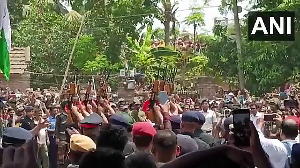Making the first effort to bridge the trust deficit between the two countries, foreign secretaries of India and Pakistan discussed all issues of mutual concern with New Delhi flagging its core concern of terrorism emanating from that country on Thursday.
Meeting for the second time in four months, foreign secretaries Nirupama Rao and Salman Bashir described their parleys as "cordial" and "constructive" during which they tried to "understand each other's position" and concern.
Rao, the first senior Indian official to travel to Pakistan after the 2008 Mumbai terror attacks, asserted that the orientation of the re-engagement between the two countries was to look at the reasons why there was a trust deficit and how it can be bridged.
"We discussed all issues, obviously our core concerns on terrorism were also articulated," Rao told a joint press conference with Bashir after their meeting. She also noted that Prime Minister Yusuf Raza Gilani had assured his Indian counterpart Manmohan Singh in Thimphu in April that Pakistan will not allow its soil to be used for terrorist activities against India.
"We believe that it is an important commitment and what we also believe is that we should jointly work together towards our goal of resolution of outstanding issues," she said.
After his meeting with Rao to prepare ground for the meeting of foreign ministers of the two countries in Islamabad on July 15, Bashir said he felt "much more optimistic" about a good outcome at the talks.
He said the two countries should "work towards restoring confidence and building trust with a view to make it possible to have comprehensive, sustained and substantial dialogue."
"The meeting was marked with a great deal of cordiality, sincerity and earnestness. The dialogue was very constructive... We have been able to review comprehensively the state of our bilateral relations. All issues of concern and interests were touched upon," Bashir said.
Rao said the discussions were not only "exploratory", but the two sides also tried to "understand each other's position."
The Indian foreign secretary said both countries must "deny the terrorist elements any opportunity to derail the peace process."
Both sides also noted that Indian Home Minister P Chidambaram and his Pakistani counterpart Rehman Malik would discuss terrorism and hoped that it will help in strengthening and solidifying the efforts to address the issue.
Chidambaram will meet Malik on Friday on the sidelines of South Asian Association for Regional Cooperation home ministers' meeting in Islamabad.
The both sides also exchanged proposals on outstanding issues including on Kashmir, humanitarian issues and terrorism, diplomatic sources said.
Unlike their last meeting in New Delhi on February 25, both sides this time were cautious in articulating their positions before the media on various issues raised during the parleys.
After their meeting, the two sides had held separate press conferences during which they came out with different versions on issues raised during the parleys.
Describing the meeting as a step forward in bilateral relations, Pakistan Foreign Minister Shah Mehmood Qureshi said the two countries should build on this development.
"I think this dialogue is a step forward. The fact that the two sides have resumed the dialogue, have agreed to sit together and talk on issues of mutual concerns is an important development. And we should build on this development," Qureshi said.
Asked whether the trust deficit can be bridged, he said: "Why not? where there is a will, there is a way."
Later, speaking to reporters, Bashir refused to go into specifics of what was discussed during his meeting with Rao.
"I would not like to go into the specifics of one or the other issue at this point of time. I think what we are trying to do here is to create the right environment. What is in the interest of both countries is to re-engage on each and every issue," he said.
Asked whether both countries were getting irritated by each other's core issues, Bashir said, "I think it is not a question of irritation. We realise that there are complex issues on both sides that we have to address."







 © 2025
© 2025